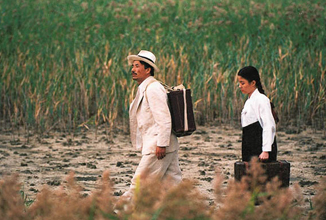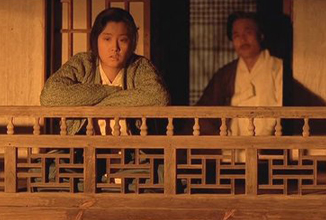Synopsis:
Following the death of his father, You-bong (Kim Myung-gon), Dong-ho (Kim Kyu-chul) goes in search of his sister Song-hwa (Oh Jung-hae), from whom he has been estranged for many years. Through flashback, we are told the story of the Dong-ho and Song-hwa's upbringing, as You-bong takes them from town to town, earning what little he can from pansori performances (ancient songs of unrequited love, loss and regret sung with accompaniment from a single drum) while teaching them the art behind successful pansori singing. When Dong-ho can take no more of his father's imposed sacrifices in the name of art, he runs away from home, leaving his sister alone in the hands of their father, not fully aware of the extremes to which You-bong is prepared to go (and the suffering that he is prepared to inflict) in order to make Song-hwa the greatest ever pansori singer...
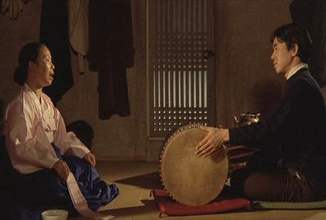 |
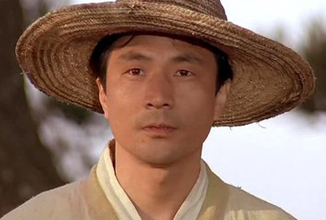 |
Review:
Ask almost any musician and they'll tell you that passion is essential to the production of their art and without it music would be little more than an empty, soulless collection of notes and sounds. Many will also wax lyrical about their willingness to sacrifice almost anything (from a decent standard of living right through to love itself) in the pursuit of musical perfection, and will even insist that those sacrifices, and suffering in life, not only accentuate the conveyance of emotion within music, but are also both necessary and vital to it, allowing that emotion to present itself as a tangible element of every single note they play or sing.
And such is the case with You-bong, at one time one of the most talented and renowned pansori singers in Korea until he was exiled from everything he knew and loved. Having had so many of his hopes and dreams taken from him, he has since held onto his passion and belief in the importance of pansori for dear life but, with the onset of middle age leading him to the realisation that he will never become what he dearly longs to be (the greatest pansori singer who ever lived), he has begun to attempt to live vicariously through his son Dong-ho and daughter Song-hwa (neither being related to him by blood), taking them with him on his travels as a wandering minstrel, living from hand to mouth, while he instructs them in (and, in fact, often forces them to learn) the art of pansori.
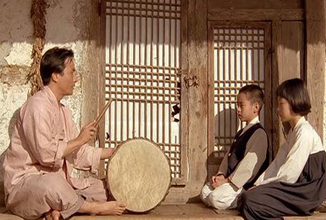 |
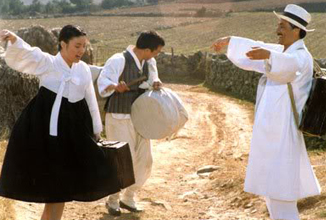 |
Like many parents whose dreams and desires have failed to be realised, You-bong is resolute in his belief that Dong-ho and Song-hwa can achieve his dreams for him, his determination and single-mindedness equaled only by his belief that sacrifice, grief and suffering are a necessary, and integral, part of truly great pansori performance. As such, he gives barely a second thought to the sacrifices he endures (and forces upon his children) and, rather, chooses to see pansori as validation for the suffering he inflicts upon them.
Through the family's trials and tribulations, Sopyonje deftly details the changing face of Korea in the years subsequent to the end of Japanese occupation, with You-bong's attempts to keep the art of pansori alive mirroring the struggles of Korea to maintain its identity and individuality in the wake of the increasing, and inexorable, march of globalisation.
In fact, the film could almost be seen as a pansori in its own right, and though any character analogies to the country's history could easily be said to be presumed, rather than actual, there are clearly similarities between You-bong and Song-hwa's individual stories and that of Korea itself - Song-hwa, in particular, being caught firmly between her father's insistence that she learn pansori at any cost (and thereby keep the artform alive); her own desire to do so; and her changing personal needs, hopes and dreams as a growing young woman, reflecting the story of a country at a time when old values increasingly struggled to survive and find their place within an ever changing, increasingly modern world which largely no longer cared for them.
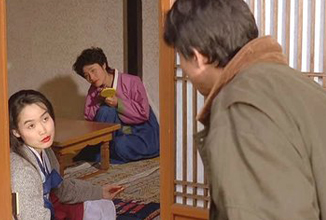 |
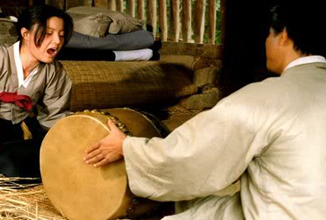 |
Sopyonje is frankly a masterpiece of Korean Cinema which tells its story with purpose, at a measured pace throughout. Large sections of the film are wholly focused on pansori performances and while viewers who have never before heard the artform may initially find it strange and utterly unfamiliar, as the film progresses this mournful and hypnotic music becomes deeply affecting, and ultimately almost cannot fail to enter both the heart and mind, resolutely refusing to leave.
Summary:
A masterpiece of Korean Cinema, Sopyonje details the trials and tribulations of both the film’s characters and historical Korea itself, with the words mournful and hypnotic serving to describe both Sopyonje, the pansori music, and Sopyonje, the film.
Cast:
The entire cast of Sopyonje give polished and accomplished performances but it is Oh Jung-hae’s portrayal of Song-hwa which will stay with you more than any other. Not only is her characterisation memorable, but her singing voice is utterly astonishing, filling the pansori with palpable emotions of passion, longing and regret.
Cast (Actor... Character):
Kim Kyu-chul… Dong-ho
Kim Myung-gon… You-bong
Oh Jung-hae… Song-hwa
Director: Im Kwon-taek
DVD:
The DVD used for this review is the Korean, Region 3, Special Edition single disc release from Taewon Entertainment which has an anamorphic transfer presented with an aspect ratio of 1.85:1. The picture is clear throughout and is free of ghosting and image artifacts.
The sound is provided as Dolby Digital 2.0, and is crisp and and clean and compliments the haunting music within the soundtrack well throughout.
Excellent subtitles are provided
throughout the main feature but English-speaking viewers should note that, as with many Korean DVD releases, there are no subtitles available on any of the extras.
DVD Details:
Actors: Kim Kyu-chul, Kim Myung-gon, Oh Jung-hae
Directors: Im Kwon-taek
Format: Anamorphic, Colour, NTSC, Subtitled, Widescreen
Audio: Korean Dolby Digital 2.0
Subtitles: Korean, A Traditional Korean Narrative Song (Korean language), English, Japanese, None
Region: Region 3
Number of discs: 1
Classification: 12 (Korean Film Classification)
Studio: Taewon Entertainment
Run Time: 113 mins (approx.)
DVD Extras:
Director & Assistant Audio Commentary
'Making Of' Featurette
'Shanghai International Film Festival' Featurette
'A Commemorative Event' Featurette
Trailer
Original Poster
Photo Gallery
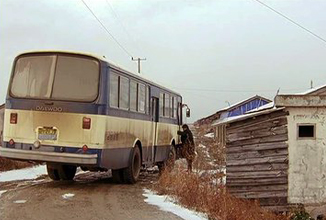 |
|








